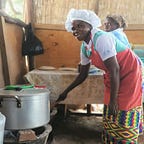A Regenerated Forest Brings Benefits to All
With support from MCHF, communities are helping the government to regenerate forests, and their villages are reaping the benefits.
Outside the town of Mzimba, along the M1, Malawi’s national highway, a few bags of charcoal are visible on the side of the road, waiting for buyers. The charcoal was produced deep in the heart of the Perekezi Forest Reserve (FR) and carried out in large 50kg bags on the shoulders of desperate men.
In between the bags of charcoal, there are women like Queen Gondwe offering passerbyers small tubs of Masuku fruit, a type of sugar plum, and fresh mushrooms. These products also come from the heart of the forest reserve. But it has become more and more difficult to gather fruit and mushrooms because burning charcoal is currently the leading cause of deforestation in Malawi.
“Those people cutting trees must stop because they are felling the Masuku trees and fruits,” laments Queen Gondwe from her village, Manunda, where 1,300 households live and depend on a healthy forest.
Manunda is located next to Perekezi FR, and Queen Gondwe is a member of the Gudu Gudu Block Management Committee (BMC), a group designated to protect and care for a block of the forest. The BMC is made up of a dozen or so volunteers and forms part of a wider forest co-management agreement with the Department of Forestry, local communities, and the M’mbelwa District Council.
With support from the USAID and UKaid co-funded Modern Cooking for Healthy Forests (MCHF), the Department of Forestry, the M’mbelwa District Council, and communities have developed a Forest Management Plan that is in line with the national forestry strategy.
In Perekezi FR, The Department of Forestry has designated 11 forest blocks co-managed by these BMCs, who raise awareness in their communities about the permitted and prohibited activities under the Malawi’s Forestry Amendment Act.
MCHF then trains committee members on assisted and natural forest regeneration, fire prevention and firebreaks, and soil and water conservation techniques. MCHF provides each committee with equipment such as shovels, picks, and pruning knives to ease the forest landscape restoration activities.
With the support from MCHF, the community from Manunda has built new firebreaks and maintained old ones, conducted spot weeding, slashed the grass, and pruned young saplings to promote their survival.
Forest Ownership
Ten years ago, the government did not allow community members access to forest reserves, unless it was to collect grass and mushrooms. Today, funding and staffing shortages have exacerbated Malawi’s struggles with charcoal-led deforestation. The increased demand for charcoal as a cooking and heating fuel in urban centers like Mzuzu has made Malawi’s protected reserves a prime target for charcoal.
“With the changing times, we allowed regular access to forest reserves and that pushed us towards co-managing the natural forests with the communities. Success depends on the forest reserve, communities, and the benefits they are getting,” explains Department of Forestry Deputy Director, Kasizo Chirambo.
“We need to see strong leadership on the part of Traditional Authorities and Chiefs. Our strategy is to continue involving the communities.”
A Forest Recovery
Assisted natural regeneration is a cost-effective, nature-based solution for restoring forested land while protecting ecosystem services like water and healthy soil that communities in Malawi need for their survival. These techniques have increased the amount of Masuku fruits and mushrooms available to the communities in Perekezi. In 2024, the Village Natural Resource Management Committee increased the area of forest interventions from 100 to 130 hectares for assisted natural restoration.
“MCHF’s efforts have helped to bring back the forest cover in most of the hotspots,” says Mr. Mnyadeni, the Assistant District Forest Officer in M’mbelwa District.
Enelesi Phiri is another woman who sells the fruits and mushrooms harvested from the forests of Perekezi. In December, when the plums are in season, she sells a small bucket of fruit for 4,000 MK ($2 USD). In 2023, she says her revenue doubled thanks to an abundant harvest. With the extra money, she buys household goods like soap and can afford to pay for the cost of milling maize, Malawi’s staple food crop.
Over the last year, MCHF has partnered with 57 local forest organizations including the management committees in seven forest reserves across Malawi. Since 2023, MCHF has trained over 800 people in assisted natural regeneration techniques.
“We need the mindset to change, and for this we need strong leadership in the communities and ensure they are interested in managing the resources that they depend on,” says Department of Forestry Deputy Director, Kasizo Chirambo.
MCHF is a five year USAID and UKaid-funded project that is partnering with government and communities to implement activities to improve management of some of Malawi’s most hard-hit forest reserves. MCHF also promotes alternative cooking energy solutions and fuel-efficient cooking technologies in order to maintain forest cover and reduce land-based emissions.
Reporting and Text by Hastings Chikoko
Additional reporting by Nicholas Parkinson / Photography by MCHF
